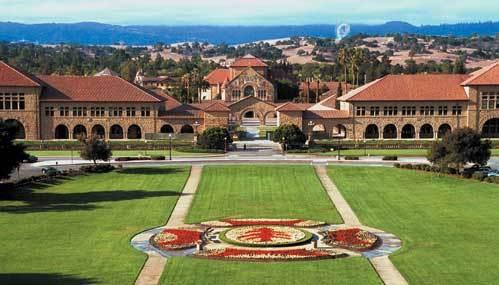Conversing with Myron Scholes, the Nobel laureate in Economics, about financial crisis, meeting Matt Flannery, the Cofounder and CEO of Kiva, the global social lending platform, and listening to the renowned Jeffrey Pfeffer, the author of best-selling book of Power, depict my colorful activities throughout studying at Stanford Graduate School of Business this winter quarter. These people represent the extreme side of changing perspectives. Myron changes the financial world. Matt awakens the ‘good’ inside all of us. Jeffrey tells the truth of influential people and their paths to power despite the truth may be not liked.
On the other spectrum, the whole experience of business school is way beyond meeting fantastic people. The experience is about an opportunity in pursuing things that you want and need. Design your own paths. If you are keen on building your own start-up, you can focus your courses and activities surrounding literally tons of resources – from fellow enthusiasts, angels, VCs, tech savors to heavyweight mentors, and intellectual property experts. If you are keen on learning your way up to corporate mastership, you have many courses focusing on soft skills development – from understanding human biases to improv and ‘acting’ skills in improving leadership, or constructing the corporate strategy – from designing organization to developing the strategy considering the beyond market factors. If you care about social innovation or non-profit management or even the family business management, there are courses and resources you can hook up with on the same reason. You will find common people in your space of interest. Even, if you don’t, you can still pursue an individual (or small group) independent research – your own topic, your own curriculum. In short, you are entering a buffet of truly vast selection of things you are excited and would enjoy, but choose the ones you really love to work on because time, as other economic resource, is not abundant. Ask yourself, what do you need and lay your paths to reach it. Don’t wait.
The above question bothers me, earlier. Probably still a bit now.
Growing up as a son of a man of trade makes me see business as a rough activity – sometimes, despite being good; you are dealing with the unknowns. Be a relentless learner – that is the living principle guiding through my mind while I migrated to bigger city, Jakarta, pursuing higher education. For a small town kid going to big city, the feeling of being in a different city and learning from the fellow students across Indonesia gave me the boost of happiness – I was so enthusiastic in deepening my knowledge and got into understanding of how business processes and industries work.
Post graduation, I was eager to jump quickly into business world – learning as much as possible and trying to self-sustain my life. Most of young productive people went to work post graduation, but less of them go for the career. I went for career, by trying to find an institution I could leverage the resources to build my career and my competence. Years passed by, I realized that I settled down, and I have become a specialist in the professional area I were on. I dreamed of one day I was going to sharpen my saw and develop a more diverse skill sets. I seek out to learn to manage a global team, step into the more senior managerial skills, and develop global networks and perspectives. I seek out the dream in pursuing such experience in the top business school.
When I got accepted in Stanford, it feels like a leap of faith. Initially, I got cold feet – I could feel the cease of the moment, as I would have to leave all the comfort zone of staying in chaotically pleasant Jakarta, my home, my works for an adventure in US, in one of the best business schools in the world.
Although I have a very high expectation of my business school experience, Stanford Business School delivers in more ways than what I earlier expected. Coming from the schooling in Indonesia that focuses more on lectures, the Stanford GSB emphasized self-discovery. You can weave your own path as I told earlier, but you would want to know what you are doing in the frist place. You could be a generalist – covering skins of couple of courses in each area, or you could be a specialist – enjoying only a certain track. I, myself, being educated in engineering and went into the banking industry with core operations background – felt strongly I need to brush up my finance skills. Meanwhile, I also take up keen interest in organization behavioral courses – one of the distinctive competences here at Stanford. Merging these with the entrepreneurial atmosphere of Stanford and the Silicon Valley is a thrilling roller coaster ride for me.
Business school (and top universities) can be an illuminating paradox. Looking into the quality of the people I meet here, I am constantly amazed by how talented they are, how wide-spanned perspectives they have, how deep the industry expertise the classes are. I felt that these people, despite being so successful or at least talented, should be doing well out there without the business school credence. Nevertheless, that is the paramount of business education – it accepts only the best caliber. It sharpens the sharpest saw. The selectivity becomes a key variable; Stanford as a university is one of the most selective schools in the world, with 7% acceptance rate for both the undergraduate program and the MBA program.
Such exclusivity gives the scholars (beyond students) the power in Asking. Here you don’t see people shying away from opportunities, they boldly reach out for experience, for networking. They make use of the preciously, elite Stanford brand – they hook up with alumni or people with the credibility of the brand, and the predicate of a student. You carve your own path, in finding your next career or your own business.
The other value I see in the business education is that you are taking up risks and test them out. If you fail afterward, there is no other place to fail than in the risk-free school environment. You can think openly, challenge your sacred cows, and challenge prevailing assumptions on everything. These mean that you can step out of your frame of mind and set out finding the areas you want to try out. No wonder, there are many start-ups mushrooming from the whole university. No wonder that some influential lecturers come from the executives experience, from CEO, venture capitalists to global bankers, government or policy makers – sharing success stories, and most importantly, failure stories. The ones you can only hear from in the setting of an educational experience. You have the access to such experiences. It is a truly a learning not found elsewhere.
Judging the above, for me, one year in the business school is not sufficient.
I want more. I envy the undergraduates or people pursuing PhD here. However, when I reflected further, the state of self-discovery – the key learning from the school – has been part of my DNA now. This is the learning you would not let go. Even my PhD friend will move on as well.
All the hard skills may be forgotten, all the formula may become hard to recall, but the connection and the conviction stay and develop way beyond the school. Now I have some time left to pursue what I would like to do, my game plan. I am eager more to see how the seeds I am planting, the paths I am putting throughout the year of my dear education will bring me beyond the schooling.
I believe in achieving something positive and better, in touching and changing lives. I have no doubt.












